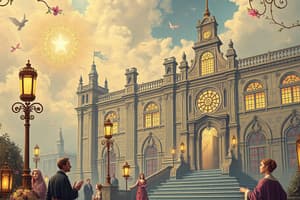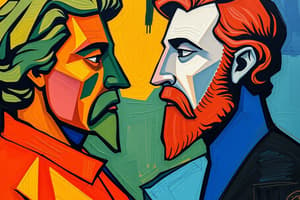Podcast
Questions and Answers
Who wrote 'Spirit of the Laws'?
Who wrote 'Spirit of the Laws'?
Montesquieu
What are the natural rights that John Locke asserted people have?
What are the natural rights that John Locke asserted people have?
Life, liberty, and property
Who advocated absolute sovereignty as necessary to resolve human selfishness?
Who advocated absolute sovereignty as necessary to resolve human selfishness?
Thomas Hobbes
What did JJ Rousseau believe about human nature?
What did JJ Rousseau believe about human nature?
What was Voltaire's stance on freedom of speech?
What was Voltaire's stance on freedom of speech?
Who is considered the father of Capitalism?
Who is considered the father of Capitalism?
What did Emmanuel Kant believe about humans?
What did Emmanuel Kant believe about humans?
What principle did Jeremy Bentham propose?
What principle did Jeremy Bentham propose?
What is Alexis de Tocqueville known for analyzing?
What is Alexis de Tocqueville known for analyzing?
Who was the pamphleteer that supported both the American and French Revolutions?
Who was the pamphleteer that supported both the American and French Revolutions?
According to John Stuart Mill, when are actions considered right?
According to John Stuart Mill, when are actions considered right?
What did Cesare Beccaria advocate for in criminal justice?
What did Cesare Beccaria advocate for in criminal justice?
Who argued for women's equality in her work 'Vindication of the Rights of Women'?
Who argued for women's equality in her work 'Vindication of the Rights of Women'?
What method did Francis Bacon formalize?
What method did Francis Bacon formalize?
What social issues did Charles Dickens address in his novels?
What social issues did Charles Dickens address in his novels?
What did Edmund Burke criticize in 'Reflections on the Revolution in France'?
What did Edmund Burke criticize in 'Reflections on the Revolution in France'?
What document did Thomas Jefferson write?
What document did Thomas Jefferson write?
What notable contributions did Benjamin Franklin make?
What notable contributions did Benjamin Franklin make?
What is David Hume known for in philosophy?
What is David Hume known for in philosophy?
Flashcards are hidden until you start studying
Study Notes
Key Classical Liberal Thinkers
-
Montesquieu: Key figure in political philosophy. Authored 'Spirit of the Laws' highlighting the contextual nature of political laws and advocating for government division.
-
John Locke: 17th-century philosopher opposing the Divine Right of Kings. Proposed natural rights to life, liberty, and property as fundamental to human existence.
-
Thomas Hobbes: Political philosopher endorsing absolute sovereignty as necessary to manage humanity's selfish tendencies. Emphasized the need for strong governance in his work.
-
Jean-Jacques Rousseau: French philosopher asserting that humans are inherently good but become corrupted by societal influences. His ideas contributed to later social contract theories.
-
Voltaire: Prominent advocate for freedom of speech in France. Critiqued government corruption and religious intolerance, reinforcing the importance of individual rights.
-
Adam Smith: Scottish moral philosopher recognized as the father of Capitalism. Authored 'On the Wealth of Nations', laying the groundwork for modern economic theory during the Scottish Enlightenment.
-
Immanuel Kant: Philosopher who believed in the inherent evil of humans, advocating for a monarchy as a solution to maintain order.
-
Jeremy Bentham: Developed the principle of utilitarianism, positing that governments should aim for the greatest good for the greatest number, shaping modern democratic thought.
-
Alexis de Tocqueville: French writer known for his critical analysis of American democracy and institutions, which examined equality and social conditions.
-
Thomas Paine: Influential American revolutionary pamphleteer who supported independence from British rule and the principles of democracy, also backing the French Revolution for its values of liberty.
-
John Stuart Mill: Championed utilitarianism and believed in actions promoting happiness. Advocated for social reform, workers' rights, and suffrage for women.
-
Cesare Beccaria: Reformer of criminal justice who denounced torture and capital punishment. Advocated for swift trials and punishments designed to deter crime.
-
Mary Wollstonecraft: Early feminist thinker arguing for women's equality and rights, including voting, in her seminal work "Vindication of the Rights of Women".
-
Francis Bacon: Formalized the empirical method and promoted inductive reasoning, significantly influencing scientific inquiry and methodologies through 'Novum Organum'.
-
Charles Dickens: Renowned novelist whose works highlighted and criticized social injustices of 19th-century England, promoting social awareness.
-
Edmund Burke: Conservative thinker and parliamentary member critical of the French Revolution. Examined its principles in 'Reflections on the Revolution in France'.
-
Thomas Jefferson: Key figure in American independence; drafted the Declaration of Independence and served as the third President of the United States, shaping early American governance.
-
Benjamin Franklin: Multifaceted founding father known for his role in the American Revolution. His contributions in diplomacy and electricity made him a respected figure in both America and Europe.
-
David Hume: Philosopher recognized for his skeptical approach to knowledge, arguing that human understanding is limited to sensory perception. Pioneered social science discussions in "Treatise on Human Nature".
Studying That Suits You
Use AI to generate personalized quizzes and flashcards to suit your learning preferences.




